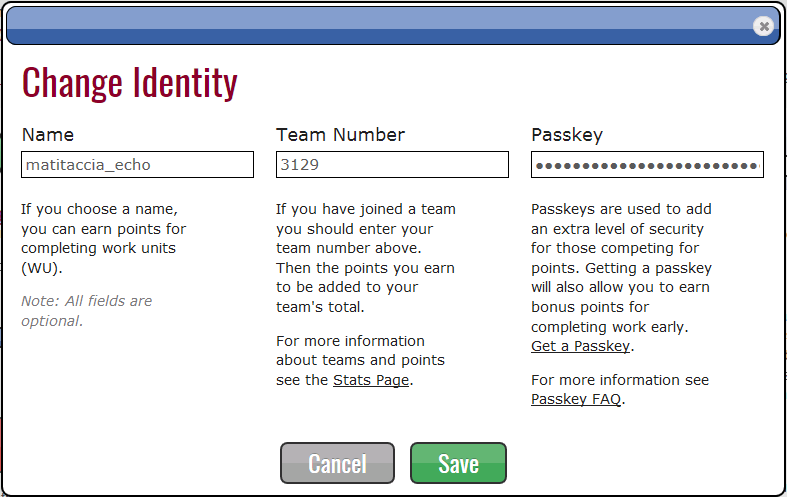Please, join us!
Please join the Swiss Folding Team and sustain, thanks to the calculating power of your computer, the research carried on by the Pande Lab of the Stanford University.
But how?
You may download the client from the official source, subscribe by using your preferred nickname, add our team number 3129 and the passkey which will be sent per email to you upon your request. After this quick steps your computer will already be working and contributing to the scientific research.

Should you have further questions or doubts please feel free to use our forums.
Just one sec… what is this all about?
You are absolutely right! It’s just that our excitement and desire of growing as a team is so big that we have skipped some crucial steps. Now we will explain to you what this is all about: the project has been created by the Pande Lab of the Stanford University, California and it is called Folding@home.
Folding@home
The Pande Lab is specialised in the research of proteins with the aim of understanding the process responsible of giving proteins their three dimensional structure. In order to do that the laboratory has developed a program (the client that we were mentioning above and that you should download in order to contribute) capable of estimating the most probable conformations of the proteins through calculations.
Well, why is the protein structure that important?
Researching the folding process of proteins is important because it has been confirmed that some diseases, like Parkinson, Alzheimer, Bovine Spongiform Encephalopathy (BSE or mad cow disease), and multiple kinds of cancers are related to some proteins having a different, not functional, structure. Therefore it is important to research and learn the folding process of proteins because this could lead to the identification of possible cures of the diseases.
By folding we understand the procedure with which proteins transform themselves, from being a linear chain of amino acids, into a fully functional protein. A simulation which has been created by the Pande Lab can be watched here: youtube link
@home instead means that thanks to the small software which has been developed by the Pande Lab it is possible for each one of us to partecipate to the research by donating some of the power of our computer when it is idling or doing nothing. The Folding@home client is capable of receiving small fragments of work (a.k.a Work Unit) from the laboratory, perform all the necessary calculations, double check the results and finally send them to the laboratory.
Ok, great. But… doesn’t the Pande Lab have some computers were they could run this on? Or some supercomputers as many of the major universities do?
In order to perform the required simulations a huge amount of CPU power is necessary and this is why the Stanford University decided to use the distributed computing reaching an estimated computing power of 90 petaflops. As per comparison the Swiss National Supercomputer Center has an estimate computing power of 16 petaflops.
About teams, nicknames and … points?
Of course it is not all about science and diseases… there is also a more fun part, which is the competition. In fact the University has been very clever by creating a system of points that are assigned to each user who completes the Work Unit (WU) which was assigned to him. Of course the quicker the computer solves the calculations the higher the amount WU that it will deliver and as a consequence the number of points that will be assigned him.
Users can compete among them or they can decide to group in teams in order to be more effective and motivated. And this is the aim of this homepage and of the Swiss Folding Team.
Should you be curious to check out our statistics you may visit Kakaostats.net
There are very few of you!
That’s true and this is why we need your help! Either by folding with your computer or by spreading the word to your friends.
